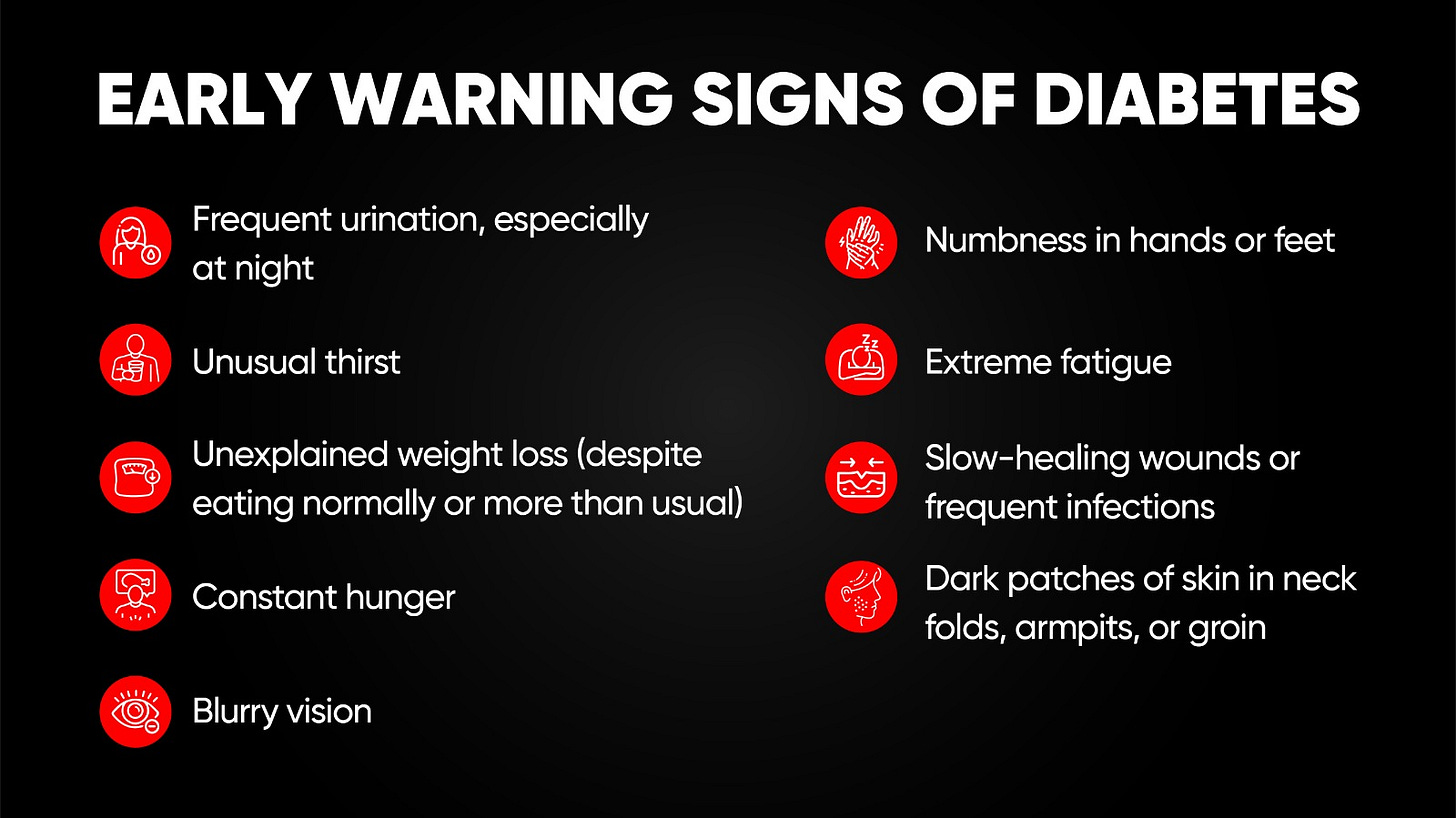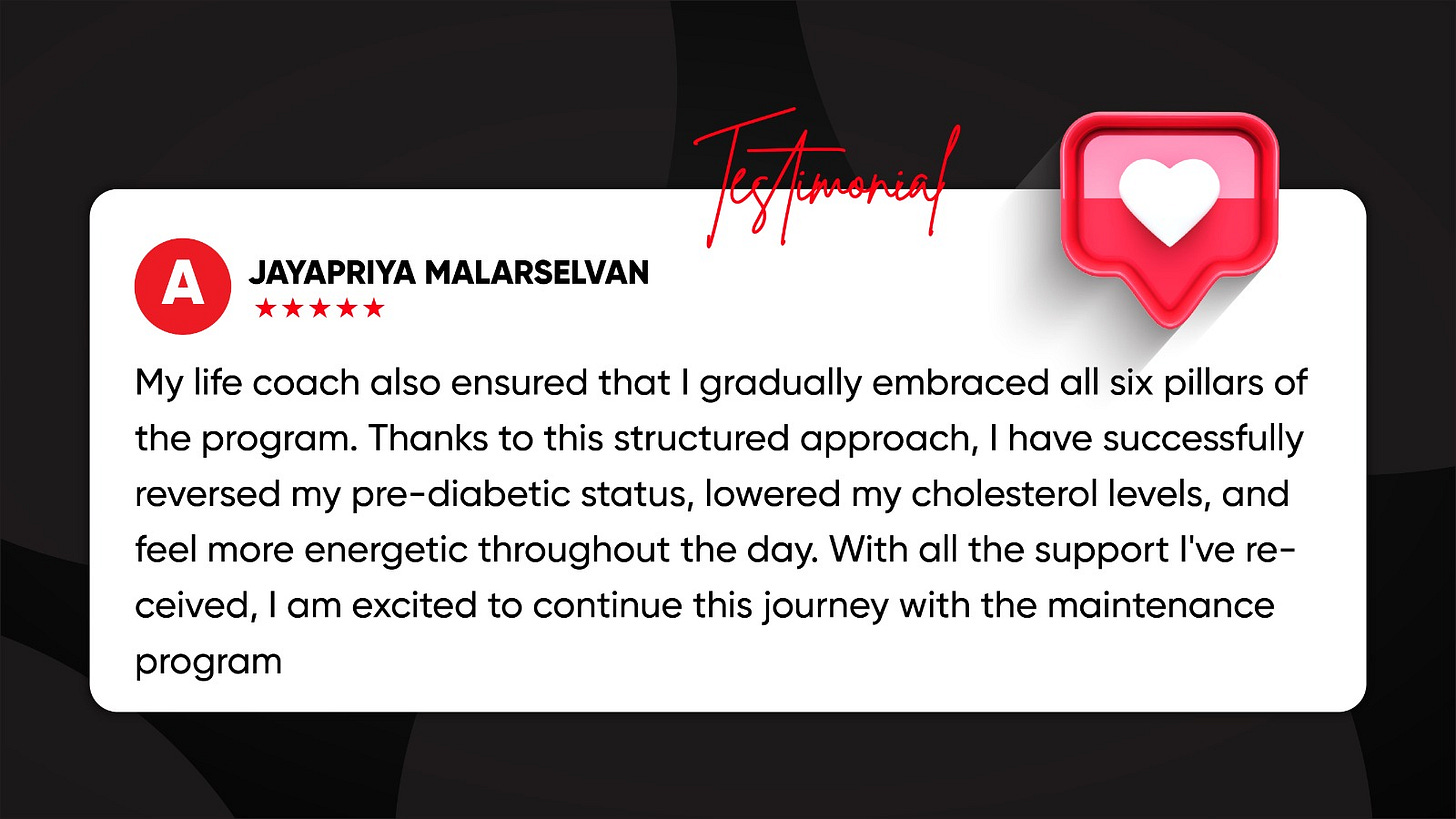
Hello Gutman Squad 👋
In March, we dived deep into understanding weight loss and sustainable methods to achieve it.
Similar to March, we will focus on one theme the entire month.
This time, it is about a chronic disease that affects millions of people - Diabetes.
Here is a fact about Diabetes no one tells you - your daily choices have far more influence on your risk than you realize.
Diabetes is rising at an alarming rate in India. The shift from active lifestyles to sedentary desk jobs, from home-cooked meals to frequent food delivery, and from regular sleep patterns to late-night work sessions has created an ideal environment for diabetes to thrive.
Not only that - most cases develop slowly over the years or remain undiagnosed, silently damaging organs and blood vessels before symptoms become obvious.
This is not to scare you but to reassure that with proper knowledge, lifestyle changes, and medication, you can prevent your body from further damage.
Before we jump into how we can prevent diabetes, let us first understand what we're dealing with.
What exactly is Diabetes?
At its core, diabetes is a disorder of how the body processes glucose.
When you eat food containing carbohydrates, your digestive system breaks them down into glucose, which enters your bloodstream. Your pancreas then releases insulin, a hormone that acts like a key, allowing glucose to enter your cells and be used as energy.
Usually, your insulin levels rise and fall in proportion to your blood sugar.
After a meal, your blood sugar rises, triggering an insulin spike to move glucose into cells.
Ideally, glucose and insulin levels should drop between meals. But people developing diabetes have frequent blood sugar spikes from certain foods and eating patterns, forcing the pancreas to release excessive insulin repeatedly.
Over time, this leads to insulin resistance - when your cells stop responding appropriately to insulin.
In diabetes, this system (sending glucose to cells) fails in one of two ways:
Either your pancreas doesn't produce enough or any insulin
Or your cells become “insulin resistant” - they don't respond appropriately to insulin, leading Pancreas to secrete extra insulin.
Due to this, glucose remains in your bloodstream instead of entering your cells.
This leads to high blood sugar (hyperglycemia.)
Different Types of Diabetes
There are mainly two types of diabetes.
Type 1 Diabetes occurs when your immune system attacks and destroys the insulin-producing cells in your pancreas.
Type 2 Diabetes is the most common type. Your body makes insulin but can't use it effectively - like having the right key but a rusty lock. While genetics play a role, lifestyle factors like diet and physical activity have a much stronger influence on developing Type 2 diabetes.
There are comparatively rare types like gestational diabetes (during pregnancy), monogenic diabetes (caused by mutations in a single gene), and secondary diabetes (from conditions like pancreatic disease.)
For this issue and during this month, we will mainly focus on Type 2 Diabetes.
Common Myths About Diabetes
With so many people dealing with diabetes, it doesn’t take long to form misconceptions. These myths sound so right it only makes sense to follow them, but they are not true in reality.
Let us address some of them:
“Only overweight people get diabetes”
While excess weight increases risk, factors like fat distribution around the abdomen, family history, and ethnicity play significant roles. Indians develop diabetes at lower BMIs compared to Western populations (meaning: you might not be obese but can develop diabetes.)
“Eating too much sugar causes diabetes”
Sugar alone doesn't cause diabetes, but a diet high in simple carbohydrates and processed foods contributes significantly. These foods cause rapid blood sugar spikes, forcing your pancreas to work overtime until it eventually can't meet the demand.
“Diabetes is not serious if you don't need insulin”
All forms of diabetes require attention, including the diabetes you control with diet or oral medications. Unmanaged diabetes leads to serious complications like heart disease, kidney failure, vision loss, and nerve damage.
“I don't have symptoms, so I must be fine”
Many people have prediabetes or even diabetes for years without knowing it. Regular check-ups are crucial, especially after age 30, as the damage often occurs silently.
“Type 2 diabetes only affects older adults”
Unfortunately, we're seeing Type 2 diabetes in younger populations more frequently. Children as young as 10 are now developing what was once called "adult-onset diabetes."
Early Warning Signs of Diabetes
Yes, diabetes often takes time to develop, but you can notice some early signals if you’re conscious:
If you experience multiple symptoms, please consult your doctor for a simple blood glucose test.
Early detection can make a tremendous difference in managing the condition.
The Gut-Diabetes Connection
As a gastroenterologist, I find the gut-diabetes connection fascinating. Your gut microbiome influences how your body processes food and manages blood sugar.
People with Type 2 diabetes often have imbalanced gut bacteria compared to those without diabetes.
How can we turn this in our favour?
In our next issue, we will explore how different foods affect your blood sugar and practical ways to make better choices every day.
Start Working on your Health Now
Whenever you are ready, my team and I at NewME would love to guide you toward a healthier lifestyle by making personalized changes.
Recently, we helped Jayapriya reverse her pre-diabetic status.
See how we can do the same for you
More Resources to Improve Your Relationship with Food
Diabetes makes you thirsty. This one drink is safe, and you won’t even complain about it.
If you spend most of your time at a desk, there is a way to lower your blood sugar while sitting.
You must have heard the advice, “Walk right after your meals.” Here is why it is a simple yet effective habit for decreasing your blood sugar.
Try This Today!
Do a simple self-assessment - Evaluate if you've experienced any warning signs or early signals.
If you’re using a food journal, add a row called ‘Possible symptoms for diabetes’ and add any warnings you notice.
Remember: Noticing these signs early can make a tremendous difference in managing diabetes before complications develop.
Don’t hesitate to consult your doctor if you spot multiple symptoms.
Dr. Pal, signing off!








Dear Dr. Pal, I had gestational diabetes during my first pregnancy at age 26(still not yet no:2). Now I am 29 years old....so do I have high chances of getting diabetic in future?